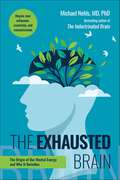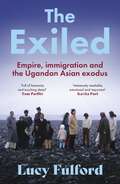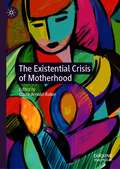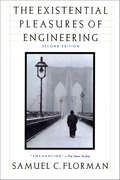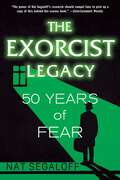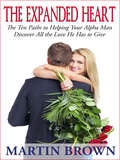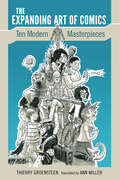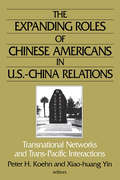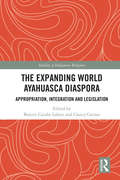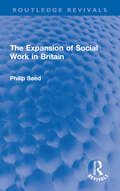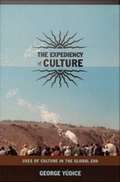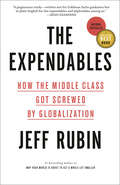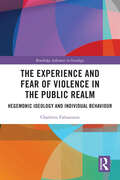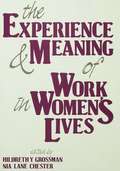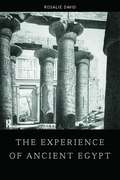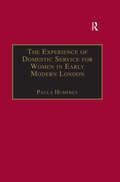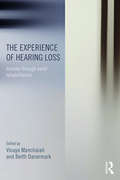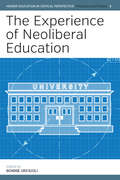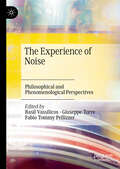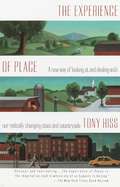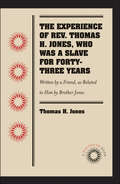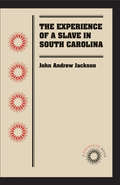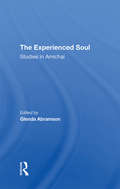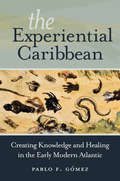- Table View
- List View
The Exhausted Brain: The Origin of Our Mental Energy and Why It Dwindles
by Michael NehlsRevitalize Your Brain, Reclaim Your Mental Energy Everyone knows the feeling after a long day—it is difficult to concentrate, make good decisions, or even empathize with others. This daily but completely natural decline in our mental capacity is called &“ego depletion,&” a state of mind that miraculously but naturally disappears after a good night's sleep. However, more and more people are waking up in a perpetual state of ego depletion: their mental energy source is not recharging—it is actually shrinking. We live in a chronically exhausted society with disastrous consequences for ourselves, society, and future generations. In The Exhausted Brain, Dr. Michael Nehls uncovers the source of our mental energy. He reveals where our "brain battery" is located, what function it serves within our brain, and how we can stop and reverse the decline in its capacity—with profound consequences for our mental wellbeing and social capacity. In short, this book will change the world.
The Exiled: Empire, Immigration and the Ugandan Asian Exodus
by Lucy FulfordUganda, August 1972. President Idi Amin makes a shocking pronouncement - the country's South Asian population is being expelled. They have ninety days to leave.After packing scant possessions and countless memories, 50,000 Ugandan Asians vied for limited space in countries including Canada, India and the United Kingdom. More than 28,000 expellees from Britain's former colony arrived in the UK and began building new lives - but their incredible stories have, until now, remained largely hidden.Fifty years on from the exodus, The Exiled draws on first-hand interviews and testimonies, including from the author's family, to illuminate a time of painful alienation and incredible courage. As an entire people stepped into the unknown, a global diaspora was born, and the fate of the United Kingdom changed forever.Journeying across continents and decades, this staggering work of reportage illuminates an essential, and under-explored, chapter in post-colonial history, challenging politically expedient narratives to uncover the true fate of minorities at the end of empire. "Weaving together tenderly reported personal stories with the grand sweep of imperial history, this is a compelling and impressive account of a time - and population - often overlooked." - Samira Shackle"A lyrical and penetrating examination of what happened to one family and the Ugandan Asians more broadly" - Giles Foden, author of THE LAST KING OF SCOTLAND
The Exiled: Empire, Immigration and the Ugandan Asian Exodus
by Lucy FulfordUganda, August 1972. President Idi Amin makes a shocking pronouncement - the country's South Asian population is being expelled. They have ninety days to leave.After packing scant possessions and countless memories, 50,000 Ugandan Asians vied for limited space in countries including Canada, India and the United Kingdom. More than 28,000 expellees from Britain's former colony arrived in the UK and began building new lives - but their incredible stories have, until now, remained largely hidden.Fifty years on from the exodus, The Exiled draws on first-hand interviews and testimonies, including from the author's family, to illuminate a time of painful alienation and incredible courage. As an entire people stepped into the unknown, a global diaspora was born, and the fate of the United Kingdom changed forever.Journeying across continents and decades, this staggering work of reportage illuminates an essential, and under-explored, chapter in post-colonial history, challenging politically expedient narratives to uncover the true fate of minorities at the end of empire. "Weaving together tenderly reported personal stories with the grand sweep of imperial history, this is a compelling and impressive account of a time - and population - often overlooked." - Samira Shackle"A lyrical and penetrating examination of what happened to one family and the Ugandan Asians more broadly" - Giles Foden, author of THE LAST KING OF SCOTLAND
The Existential Crisis of Motherhood
by Claire Arnold-BakerThis book offers a new perspective on the motherhood experience. Drawing on existential philosophy and recent phenomenological research into motherhood, the book demonstrates how motherhood can be understood as an existential crisis. It argues that an awareness of the existential issues women face will enable mothers to gain a deeper understanding of the multifaceted aspects of their experience. The book is divided into four sections: Existential Crisis, Maternal Mental Health Crisis, Social Crisis and Working with Existential Crisis, where each section. Each chapter is based on either experiential research or the author’s extensive therapeutic experience of working with mothers and reflects different aspects of the motherhood journey, all through the lens of a philosophical existential approach. The book is essential reading for mental health practitioners and researchers working with mothers, midwives and health visitors, but it is also written for mothers, with the aim to offer new insights on this important life transition.
The Existential Pleasures of Engineering
by Samuel C. FlormanA classic examination of how engineers think and feel about their profession and its philosophy.“A useful read for engineers given to self-scrutiny, and a stimulating one for the layman interested in the ancient schism between machines and men’s souls.” —TimeHumans have always sought to change their environment, building houses, monuments, temples, and roads. In the process, they have remade the fabric of the world into newly functional objects that are also works of art to be admired. Now as engineering plays an increasingly important role in the world while coming under attack for all manner of sins, one must wonder about the nature of the engineering experience in our time.In this, the second edition of his popular Existential Pleasures of Engineering, Samuel Florman perceptively explores how engineers think and feel about their profession. Dispelling the myth that engineering is cold and passionless, Florman celebrates it as something vital and alive. He views engineering as a response to some of our deepest impulses, rich in spiritual and sensual rewards. Opposing the “antitechnology” stance, Florman brilliantly emerges with a more practical, creative, and fun philosophy of engineering that boasts pride in his craft.First published in 1976, this classic book is essential reading for anyone curious about what wonders we have wrought.“Gracefully written . . . refreshing and highly infectious enthusiasm . . . imaginatively engineered.” —The New York Times Book Review
The Exorcist Legacy: 50 Years of Fear
by Nat SegaloffForeword by John Russo Updated and Expanded with a New Coda A provocative, fascinating, and compulsively readable account of one of the most shocking, influential, and successful films of all time, The Exorcist, with a new coda on The Exorcist: Believer and the upcoming The Exorcist: Deceiver. On December 26, 1973, The Exorcist was released. Within days it had become legend. Moviegoers braved hours-long lines in winter weather to see it. Some audience members famously fainted or vomited. Half a century later, the movie that both inspired and transcends the modern horror genre has lost none of its power to terrify and unsettle.The Exorcist Legacy reveals the complete story of this cultural phenomenon, from the 1949 real-life exorcism in Maryland that inspired William Peter Blatty&’s bestselling novel on which the movie is based, to its many sequels, prequels, TV series, and homages. Nat Segaloff, biographer of the film&’s director, William Friedkin, draws on original interviews with cast, crew, and participants as well as revelations from personal papers to present an intriguing and surprising new view of the making of the movie, and its aftermath. Segaloff also examines as never before the keys to the movie&’s enduring appeal. Friedkin and Blatty&’s goal was far more ambitious than making a scary movie; they aimed to make people &“think about the concept of good and evil.&” The Exorcist succeeds, and then some, not just by creating on-screen scares, but by challenging viewers&’ deepest personal beliefs—and fears.
The Expanded Heart: The Ten Paths to Helping Your Alpha Man Discover All the Love He Has to Give
by Martin BrownThe Expanded Heart presents ten paths alpha males can follow that will open their hearts to a world of new possibilities, with the help of the women in their lives. In this easy to read, easy to follow guide, you'll learn to: - Make Peace with the Past - Live an Engaged Life - Harness the Power of Spiritual Awareness; and - Increase Your Appreciation of Intimacy. Each path requires the efforts of two loving partners to accomplish the desired results. Because of a persistent failure to see his partner's point of view, too many alpha males never fulfill their potential as life partners. Instead of opening up to new ideas, too many alpha males become disinterested and disconnected from their partners. Rather than keeping an open mind that helps nurture an expanded heart, their hearts grow harder and less giving. This book takes both partners on a journey of self-improvement and self-discovery. At the conclusion of this journey, you will both know the essential elements that create an expanded heart and enhance your lives together, allowing you to become the loving, committed partners you were always meant to be.
The Expanding Art of Comics: Ten Modern Masterpieces
by Thierry GroensteenIn The Expanding Art of Comics: Ten Modern Masterpieces, prominent scholar Thierry Groensteen offers a distinct perspective on important evolutions in comics since the 1960s through close readings of ten seminal works. He covers over half a century of comics production, sampling a single work from the sixties (Ballad of the Salt Sea by Hugo Pratt), seventies (The Airtight Garage of Jerry Cornelius by Moebius), eighties (Watchmen by Alan Moore and Dave Gibbons), and nineties (Epileptic by David B.). Then this remarkable critic, scholar, and author of The System of Comics and Comics and Narration delves into recent masterpieces, such as Building Stories by Chris Ware.Each of these books created an opening, achieved a breakthrough, offered a new narrative model, or took up an emerging tendency and perfected it. Groensteen recaptures the impact with which these works, each in its own way, broke with what had gone before. He regards comics as an expanding art, not only because groundbreaking works such as these are increasing in number, but also because it is an art that has only gradually become aware of its considerable potential and is unceasingly opening up new expressive terrain.
The Expanding Roles of Chinese Americans in U.S.-China Relations: Transnational Networks and Trans-Pacific Interactions
by Xiao-huang Yin Peter Koehn Xiao-Huang YinThis book addresses the historical and contemporary involvement of Chinese Americans from diverse walks of life in U.S.-China relations. The contributors present new evidence and fresh perspectives on familiar and unfamiliar national and transnational networks - including families, businesspersons, community newspapers, students, lobbyists, philanthropists, and scientists - and consider the likely future impact of such contacts on the most important bilateral relationship at the start of the new millennium. The volume makes a multidisciplinary contribution to understanding the extensive and vital roles and promise of Chinese Americans at this critical juncture in U.S.-China relations, and to revealing the importance of migrants as actors in contemporary global politics. The assessments shared by the contributors suggest that the nature and scope of the Chinese American involvement, particularly in global civil society networks, increasingly will determine the outcome of state-to-state relations between the United States and the PRC.
The Expanding World Ayahuasca Diaspora: Appropriation, Integration and Legislation (Vitality of Indigenous Religions)
by Beatriz Caiuby Labate Clancy CavnarDuring its expansion from the Amazon jungle to Western societies, ayahuasca use has encountered different legal and cultural responses. Following on from the earlier edited collection, The Expanding World Ayahuasca Diaspora continues to explore how certain alternative global religious groups, shamanic tourism industries and recreational drug milieus grounded in the consumption of the traditionally Amazonian psychoactive drink ayahuasca embody various challenges associated with modern societies. Each contributor explores the symbolic effects of a "bureaucratization of enchantment" in religious practice, and the "sanitizing" of indigenous rituals for tourist markets. Chapters include ethnographic investigations of ritual practice, transnational religious ideology, the politics of healing and the invention of tradition. Larger questions on the commodification of ayahuasca and the categories of sacred and profane are also addressed. Exploring classic and contemporary issues in social science and the humanities, this book provides rich material on the bourgeoning expansion of ayahuasca use around the globe. As such, it will appeal to students and academics in religious studies, anthropology, sociology, psychology, cultural studies, biology, ecology, law and conservation.
The Expansion of Social Work in Britain (Routledge Revivals)
by Philip SeedFirst published in 1973, The Expansion of Social Work in Britain presents an overview of the history of social work to develop an understanding of what modern social work ‘is’ and of what the rapid expansion of social work ‘means’ as a social phenomenon. Divided into three parts, Part I examines the traditions and the forms of social action in the nineteenth century from which social work originated. Part II presents the period following the Second World War and concentrate particularly on the development of family casework in relation to what was sometimes called ‘the problem of the problem family.’ Part III examines the context of the expansion of social work in Britain into the field of community work. This book is an essential read for students of social work and social work professionals.
The Expediency of Culture: Uses of Culture in the Global Era
by George YúdiceThe Expediency of Culture is a pioneering theorization of the changing role of culture in an increasingly globalized world. George Ydice explores critically how groups ranging from indigenous activists to nation-states to nongovernmental organizations have all come to see culture as a valuable resource to be invested in, contested, and used for varied sociopolitical and economic ends. Through a dazzling series of illustrative studies, Ydice challenges the Gramscian notion of cultural struggle for hegemony and instead develops an understanding of culture where cultural agency at every level is negotiated within globalized contexts dominated by the active management and administration of culture. He describes a world where "high" culture (such as the Guggenheim Museum in Bilbao, Spain) is a mode of urban development, rituals and everyday aesthetic practices are mobilized to promote tourism and the heritage industries, and mass culture industries comprise significant portions of a number of countries' gross national products. Ydice contends that a new international division of cultural labor has emerged, combining local difference with transnational administration and investment. This does not mean that today's increasingly transnational culture--exemplified by the entertainment industries and the so-called global civil society of nongovernmental organizations--is necessarily homogenized. He demonstrates that national and regional differences are still functional, shaping the meaning of phenomena from pop songs to antiracist activism. Ydice considers a range of sites where identity politics and cultural agency are negotiated in the face of powerful transnational forces. He analyzes appropriations of American funk music as well as a citizen action initiative in Rio de Janeiro to show how global notions such as cultural difference are deployed within specific social fields. He provides a political and cultural economy of a vast and increasingly influential art event-- insite a triennial festival extending from San Diego to Tijuana. He also reflects on the city of Miami as one of a number of transnational "cultural corridors" and on the uses of culture in an unstable world where censorship and terrorist acts interrupt the usual channels of capitalist and artistic flows.
The Expendables: How the Middle Class Got Screwed By Globalization
by Jeff RubinFrom the #1 bestselling author of Why Your World Is About to Get A Whole Lot Smaller, a provocative, far-reaching account of how the middle class got stuck with the bill for globalization, and how the blowback--from Brexit to Trump to populist Europe--will change the developed world.Real wages in North America have not risen since the 1970s. Union membership has collapsed. Full-time employment is beginning to look like a quaint idea from the distant past. If it seems that the middle class is in retreat around the developed world, it is. Former CIBC World Markets Chief Economist Jeff Rubin argues that all this was foreseeable back when Canada, the United States and Mexico first started talking free trade. Labour argued then that manufacturing jobs would move to Mexico. Free-trade advocates disagreed. Today, Canadian and American factories sit idle. More steel is used to make bottlecaps than cars. Meanwhile, Mexico has become one of the world's biggest automotive exporters. And it's not just NAFTA. Cheap oil, low interest rates, global deregulation and tax policies that benefit the rich all have the same effect: the erosion of the middle class. Growing global inequality is a problem of our own making, Rubin argues. And solving it won't be easy if we draw on the same ideas about capital and labour, right and left, that led us to this cliff. Articulating a vision that dovetails with the ideas of both Naomi Klein and Donald Trump, The Expendables is an exhilaratingly fresh perspective that is at once humane and irascible, fearless and rigorous, and most importantly, timely. GDP is growing, the stock market is up and unemployment is down, but the surprise of the book is that even the good news is good for only one percent of us.
The Experience and Fear of Violence in the Public Realm: Hegemonic Ideology and Individual Behaviour (Routledge Advances in Sociology)
by Charlotte FabianssonThis book explores violent and discriminatory values and beliefs and their interconnectedness between societal echelons. Violence has a foundation and a context. It comes from somewhere and is directed at someone or something, and it has an ambience established through generations of social, cultural, political, financial and religious strategies. It fashions nation-states’ hegemonic ideology and frames individual behaviours and attitudes, thus creating a milieu that enables the normalisation of violence. The focus is on violence-infused behaviours and actions in the public realm, a multifunctional environment for social and cultural activities, as well as a workplace, entertainment and transport hub. It is a public setting, sometimes demanding onerous deftness of individuals to stay safe. Attitudes, values and beliefs around violence, harassment and discrimination in the public realm frequently occur openly without anyone noticing that a crime has been committed, including by close bystanders. An audience steeped in societal hegemonic social and cultural patriarchal ideology might be oblivious to harassing or discriminative behaviours and attitudes against females, minority genders and ethnic minority groups. The habitual nature and normalisation of these invisible crimes make them easy to dismiss. Violence materialises on all societal levels: the hegemonic structural (macro) level, consisting of the society’s dominating political, financial, social, cultural and religious leaders, educational and community institutions (meso) level and the individual-agency (micro) level, hence the nationstate’s populace. Societal order is underpinned by structural, systemic and symbolic violence, all integrated into contemporary society’s cultural and social fabric, thus inconspicuous social norms as ingrained through internalisation. The book is written from a sociological perspective and within the risk society discourse, where the risk of violence in the public domain is omnipresent. Discourses of Arendt, Bauman, Bourdieu, Marx, Foucault, Galtung and Beck and present-day analysis underpin the discussions. The agency and political leadership research emphatically show that violence and discrimination are normalised and ingrained in the contemporary milieu.
The Experience and Meaning of Work in Women's Lives
by Hildreth Y. Grossman Nia Lane ChesterIn the past, social scientists have relied predominantly on traditional models of work to understand women's experiences. These models, however, have been based on men's occupational experiences, which have been assumed to be the same for women. More recently, researchers and theorists from a variety of disciplines have begun to challenge earlier assumptions as inaccurate reflections of the realities for female workers. Newer studies have concentrated on the historical and social reasons for women's employment and career choices, including changes in economy, family, and social conditions. To provide a deeper understanding of women worker's realities by including the meaning they make of their work experiences, the editors have assembled the research of social scientists from various disciplines whose investigations focused exclusively on this subject. Their qualitative methodology provides a forum for women to voice issues, raise questions, and share self-reflections about their work experiences and the meaning they make of their work in the context of the rest of their lives. The common themes that are interwoven within the fabric of women's work experience are: the need to expand traditional definitions of what constitutes "work;" the fluid nature of boundaries between personal life and work life; the importance of the relational aspects of their work; the issues related to the uses of power at work; the role of work in the development of women's sense of self and personal identity; and the degree to which women's work experience is colored by discrimination and sexism.
The Experience of Ancient Egypt (Experience of Archaeology)
by Rosalie DavidThe Experience of Ancient Egypt provides a comprehensive portrait of what we know about ancient Egypt today, examining in detail issues of religion, of beliefs and practices surrounding death, of everyday life and of literature.In an engaging style, the author traces Egyptology from its classical roots, through the painstaking process of deciphering Egyptian hieroglyphs in the eighteenth and nineteenth centuries, to the most up-to-date bio-medical and archaeological techniques, never forgetting how time has proved that it is impossible to deliver the absolute truth about ancient Egypt.
The Experience of Domestic Service for Women in Early Modern London (The Early Modern Englishwoman, 1500-1750: Contemporary Editions)
by Paula HumfreyThe late seventeenth- and early eighteenth-century texts presented here describe female servants' experiences of work in early modern London. Domestics' court depositions offer qualitative evidence that female servants were an important support of emergent capitalism in the early modern metropolis. Exposed here are the contractual underpinnings of domestic service for women; the mobility that domestic servants enjoyed; and the concern that this mobility generated in the authorities. Paid domestic work has traditionally been regarded by historians simply as a pre-marital phase of women's lives. In fact, the depositions in this volume show that service was a prototypical form of female wage labour. While some women left service once they married, others relied on domestic positions as an avenue to generating income as life-long single women, as married women, and as widows. Even though they usually lived in poverty, labouring women who worked as servants in London had considerably more agency than has earlier been recognized. Female servants who deposed before London ecclesiastical and parish courts three centuries ago were mostly non-literate. Strikingly, their individual voices are clear and distinct as they present information about their working and personal circumstances.
The Experience of Hearing Loss: Journey Through Aural Rehabilitation
by Berth Danermark Vinaya ManchaiahHearing loss is a common chronic condition which is often poorly recognized but can have multiple negative impacts, not just on the lives of those directly affected, but also those living with them. People with impaired hearing may begin a long and uncertain journey involving a number of key stages, from emerging awareness and help-seeking, to diagnosis, adjustment, and self-evaluation. Based on a model of person-centered audiological rehabilitation, this book explains why it is important to understand both patients’ own experiences, and those of their communication partners, over time. It focuses particularly on the human dynamics of hearing loss, exploring the broader consequences of hearing loss for the individual, family members, and wider society. In particular the book: gives insight into the patients' and their communication partners’ experiences and perspectives through clear and telling first-hand narrative accounts; examines how people understand their own hearing loss, reflect on their experiences with hearing aids – both positive and negative – and evaluate treatment options; considers the changes needed to conversations in order to include all communication partners, whether with impaired hearing or not; and discusses consequences of hearing loss using the International Classification of Functioning, Disability and Health (ICF). With its explicit aim to increase awareness of the need to include the patient and close relatives in the process of rehabilitation, this new text makes an important contribution to further improve evidence-based practice in the field of audiological rehabilitation. An ideal text for audiology, ENT, and nursing students of all levels.
The Experience of Neoliberal Education (Higher Education in Critical Perspective: Practices and Policies #4)
by Bonnie UrciuoliThe college experience is increasingly positioned to demonstrate its value as a worthwhile return on investment. Specific, definable activities, such as research experience, first-year experience, and experiential learning, are marketed as delivering precise skill sets in the form of an individual educational package. Through ethnography-based analysis, the contributors to this volume explore how these commodified "experiences" have turned students into consumers and given them the illusion that they are in control of their investment. They further reveal how the pressure to plan every move with a constant eye on a demonstrable return has supplanted traditional approaches to classroom education and profoundly altered the student experience.
The Experience of Noise: Philosophical and Phenomenological Perspectives
by Giuseppe Torre Basil Vassilicos Fabio Tommy PellizzerThis volume&’s aim is to stimulate philosophical interest in the experience of noise. There are at least three important open questions about noise. First, how should the relationship between noise as a scientific phenomenon and as a type of experience be understood? Is the one to be understood in terms of the other, and what implications may be drawn from this? Second, are experiences of noise strictly limited to perceptual states or to one type of perceptual state – for instance, to acoustic experiences? E.g. is there noise that is visual or tactile? Is there noise that is cognitive, affective, or evaluative? Third, how can philosophy make sense of noise in the first place? Should noise simply be relegated to the hither side of the explananda of philosophy, as the mere leftover of whatever philosophy sets out to account for; meaning, being, totality, etc.? Or may noise be understood as a positive phenomenon in its own right, which has its own distinctive features and content, difficult though they might be to pin down? This volume will contribute to the burgeoning philosophy of noise by highlighting how contemporary philosophical perspectives with a phenomenological or experiential bent can make inroads to these questions about a fascinating yet little understood quarter of human experience.
The Experience of Place: A New Way of Looking at and Dealing With our Radically Changing Cities and Count ryside
by Tony Hiss'The Experience of Place' offers an innovative and delightfully readable proposal for new ways of planning, building, and managing our most immediate and overlooked surroundings.
The Experience of Rev. Thomas H. Jones, Who Was a Slave for Forty-Three Years
by Thomas H. JonesOriginally published in order to raise money to purchase his son's freedom, Thomas Jones's autobiography first appeared in the 1850s. This version, published in 1885, includes not only Jones's account of his childhood and young adult life as a slave in North Carolina, but also a long additional section in which Jones describes his experiences as a minister in North Carolina, while still enslaved, and then on the abolitionist lecture circuit in Massachusetts and the Maritime Provinces of Canada after he stowed away on a ship bound for New York in 1849. The narrative's most prominent focus is on Jones's ministry in and around Wilmington, North Carolina, before he escaped. The narrative puts a characteristically postbellum emphasis on shared religious devotion and even fondness between African Americans and whites. Perhaps the most compelling scene, however, is Jones's account of his forcible separation from his first wife and their three children, whom he never saw again.A DOCSOUTH BOOK. This collaboration between UNC Press and the University of North Carolina at Chapel Hill Library brings selected classic works from the digital library of Documenting the American South back into print. DocSouth Books uses the latest digital technologies to make these works available as downloadable e-books or print-on-demand publications. DocSouth Books are unaltered from the original publication, providing affordable and easily accessible editions to a new generation of scholars, students, and general readers.
The Experience of a Slave in South Carolina
by John Andrew JacksonIn The Experience of a Slave in South Carolina, escaped slave John Andrew Jackson seeks to educate his readers on the horrors of slavery. He spares no details in relating the murder of his sister, the separation of his family, and his own frequent whippings at the hands of a "Christian" master and mistress. He offers a scathing review of white religious hypocrisy, criticizing those who could not see the contradiction between worshiping a merciful God on Sundays and holding slaves under inhumane conditions. Jackson details his escape from slavery into Massachusetts as a ship stowaway after he is separated by sale from his first wife and child. He also describes his interactions with Harriet Beecher Stowe; his failed attempts to purchase the freedom of his family members; and his eventual escape into Canada following the passage of the Fugitive Slave Law. His work also includes a variety of carefully recorded hymns and antislavery songs. Jackson would eventually flee to England with his second wife before returning to South Carolina after the War. A DOCSOUTH BOOK. This collaboration between UNC Press and the University of North Carolina at Chapel Hill Library brings selected classic works from the digital library of Documenting the American South back into print. DocSouth Books uses the latest digital technologies to make these works available as downloadable e-books or print-on-demand publications. DocSouth Books are unaltered from the original publication, providing affordable and easily accessible editions to a new generation of scholars, students, and general readers.
The Experienced Soul: Studies In Amichai
by Glenda AbramsonYehuda Amichai is Israel's foremost poet as well as a significant novelist and dramatist. He has received every major Israeli prize for literature, and his poetry has been translated into over twenty languages. Amichai has served as poet-in-residence at major universities across the United States and has been a Sequent visitor to the University of Oxford. In this volume, the world's leading authorities on Amichai explore all the major genres and themes of his work. The result is an important book that is a unique and comprehensive scholarly overview of a major twentieth-century literary figure. It will prove especially valuable to those teaching modern Hebrew literature at English-language universities.
The Experiential Caribbean: Creating Knowledge and Healing in the Early Modern Atlantic
by Pablo F. GómezOpening a window on a dynamic realm far beyond imperial courts, anatomical theaters, and learned societies, Pablo F. Gomez examines the strategies that Caribbean people used to create authoritative, experientially based knowledge about the human body and the natural world during the long seventeenth century. Gomez treats the early modern intellectual culture of these mostly black and free Caribbean communities on its own merits and not only as it relates to well-known frameworks for the study of science and medicine.Drawing on an array of governmental and ecclesiastical sources—notably Inquisition records—Gomez highlights more than one hundred black ritual practitioners regarded as masters of healing practices and as social and spiritual leaders. He shows how they developed evidence-based healing principles based on sensorial experience rather than on dogma. He elucidates how they nourished ideas about the universality of human bodies, which contributed to the rise of empirical testing of disease origins and cures. Both colonial authorities and Caribbean people of all conditions viewed this experiential knowledge as powerful and competitive. In some ways, it served to respond to the ills of slavery. Even more crucial, however, it demonstrates how the black Atlantic helped creatively to fashion the early modern world.
